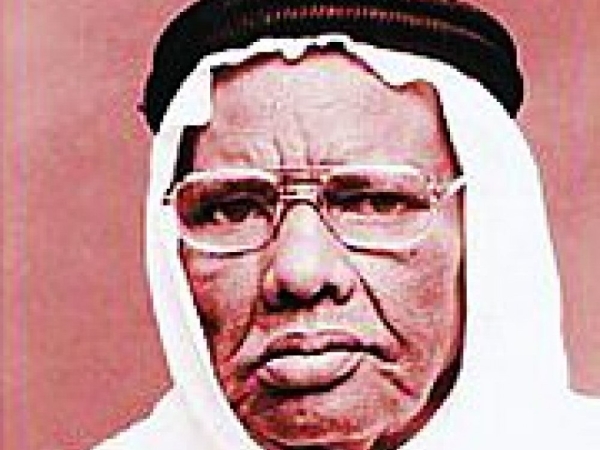

Taher Bin Abdulrahman Zamakhshari (1914-1987) was a poet, media figure, and a prominent symbol of literature, culture, and media in the Kingdom of Saudi Arabia. He significantly contributed to advancing Saudi culture and is considered a pioneer of contemporary children's literature, being one of the first to focus on this genre in the Kingdom.
He began his career by launching the first radio program dedicated to children, earning him the title "Baba Taher." He was the founder of the first Saudi magazine for children and a trailblazer in Saudi radio, where he established the first choir for national anthems. Additionally, he was the first sports commentator in Saudi radio history. Zamakhshari published Ahlam al-Rabi' (Spring Dreams), the first printed Diwan (anthology) of modern Saudi poetry, and became one of the most prolific Saudi poets, with twenty-three collections to his name. His poetry was sung by esteemed Saudi and Arab artists, including Mohammed Abdu and Talal Maddah.
Life of Taher Zamakhshari
Taher Zamakhshari was born in Makkah al-Mukarramah City and grew up in Harat al-Falaq. He attended al-Falah Schools, where he was recognized as one of the top students, showcasing a wide range of talents and abilities. He graduated in 1929 and began his career in the government sector, starting at the General Directorate of Census, his first position. He later transitioned to the education sector, becoming a teacher at the orphanage in al-Madinah al-Munawwarah. Zamakhshari eventually secured a position at the Amiri Printing Press, where he worked as a clerk and proofreader.
Zamakhshari also served as a writer and proofreader for Umm al-Qura newspaper before handling secretarial roles for years. He first worked as a secretary at Holy Makkah Municipality, then as a secretary at the municipality of Riyadh, the capital, and later at al-Kharj Municipality. Finally, he settled into a secretarial position at the Customs Bureau within the Ministry of Finance.
Taher Zamakhshari and Saudi radio
Taher Zamakhshari was among the first to join Saudi Radio in Makkah al-Mukarramah after its establishment in 1949. He was a pioneer in several contributions, launching the first children's radio program titled Rukn al-Atfal (Children's Corner) and founding the first radio choir for national anthems. He also became the first sports commentator to broadcast football matches on Saudi radio. Zamakhshari advanced through the ranks, taking on various roles within the radio station. He began as a writer, then became a presenter and program host, eventually being appointed General Program Supervisor at Saudi Radio. In addition to his work in the Kingdom, he presented programs and participated in several Arab and foreign radio stations, including those in Libya, Morocco, London, Egypt, and Tunisia.
Taher Zamakhshari enriched the Saudi children's library with both written and audio materials. He was instrumental in founding the first children's magazine in the Kingdom, which he named "al-Rawda Magazine". The first issue was published in 1959, and although it continued for only four years, it paved the way for other initiatives focused on children. Among his most famous radio and television programs was "Baba Taher," a name that became synonymous with Taher Zamakhshari.
Poetry of Taher Zamakhshari
Taher Zamakhshari began composing poetry at an early age and became one of the most prominent modernizers of poetry in the Kingdom. He can be described as a "poet of words," as he emphasized the poetic word over the concept. Some researchers consider him an emotional poet, possibly one of the foremost poets of sentimentality and subjectivity in Saudi literature. Zamakhshari was also a prolific poet, publishing over twenty-three poetry collections in less than forty years. His first collection, al-Mahrjan (the Festival) was released in 1945 and included various poetic and prose pieces in celebration of the first visit of King Faisal Bin Abdulaziz Al Saud (then Prince Faisal) to the United States.
Taher Zamakhshari honors
Taher Zamakhshari served as the editor-in-chief of al-Bilad newspaper when it was known as al-Bilad al-Saudia, which was published from Makkah al-Mukarramah. He received numerous medals and awards both within the Kingdom and internationally, including the State Prize in Literature in 1985, which he received from King Fahd Bin Abdulaziz Al Saud. Additionally, he was awarded two medals by the Tunisian government in 1963 and 1974.
Songs with lyrics by Taher Zamakhshari
Zamakhshari's poetry captivated a discerning audience, including leading Saudi and Arab artists who eagerly sought the opportunity to set his verses to music. In the Kingdom, Mohammed Abdu sang Ya A'azab al-Hub, while Talal Maddah performed Asmar Heliwa. Zamakhshari held Maddah in high regard, dedicating a poem to him titled Ya Mo'zef al-Hub, which was published in a newspaper at the time.
Tariq Abdul-Hakim also sang al-Marutin which begins with the famous line Ahim Bi-Ruhi 'ala al-Rabiya (My soul wanders the Earth). Abdul Majeed Abdullah and Ibtisam Lutfi were also among the Saudi artists who sang one of his poems. As for the Arab World, Hiyam Younes, Aida Boukhris, and many others used his poems as lyrical material. Zamakhshari’s lyrical poems contributed to transferring the Saudi song to other cultures, and the opening verse became famous:
"I cry and laugh, and the conditions are the same.
I fold over them a heart that has been healed by pain.
If you see my tears while laughing,
Then the tears smile from the crowd of pain."
Diwans of Taher Zamakhshari
Zamakhshari published several Diwans during his life, among which are Ahlam al-Rabi, Hamasat, and Aghareed al-Sahra', all issued in Cairo in 1946, 1952, and 1958, respectively; Alhan al-Moghtareb issued in Beirut in 1963; Labbaik, issued in Makkah al-Mukarramah in 1968; al-Afak al-Akhdar, issued in Tunisia City in 1970, where he stayed for a long time; and a Diwan about the Palestinian Cause, with the title Min al-Khiyam, issued in 1970.
He also published Ruba'iyat Saba Najd issued in Jeddah City in 1973; the Diwan Ma'azif al-Ashgan, issued in Tunisia in 1976; Nafiza 'ala al-Kamar, named after a broadcast he presented and issued in Tunisia in 1979; the Diwan Abeer al-Zikriyat in Jeddah in 1980; The Green Collection in 1982; and The Nile Collection in 1984.
Related quizzes
Related articles


